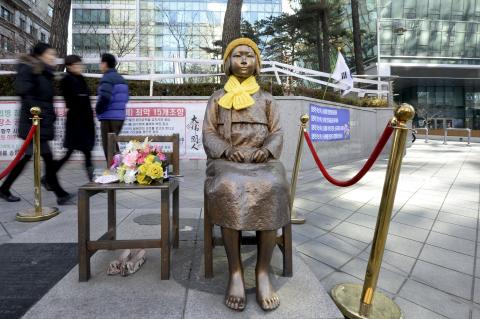South Korea and Japan yesterday reached a landmark agreement to resolve the issue of “comfort women,” as those who were forced to work in Japan’s wartime brothels were euphemistically known, which has long plagued ties between the neighbors.
The foreign ministers of the two countries said after a meeting in Seoul that the comfort women issue would be “finally and irreversibly resolved” if all conditions were met.
South Korean President Park Geun-hye and Japanese Prime Minister Shinzo Abe pledged to take the opportunity to boost bilateral ties soon after the agreement by the foreign ministers.

Photo: Reuters
The accord is likely to be welcomed by the US, which has been keen for improved relations between its two major Asian allies in the face of an increasingly assertive China and an unpredictable North Korea.
Strains between Tokyo and Seoul have prevented the two countries from signing an agreement to share sensitive military information, so a year ago they signed a three-way pact under which Seoul routes its information to the US, which then passes it on to Japan, and vice versa.
Park “hoped that since the two governments worked through a difficult process to reach this agreement, they can cooperate closely to start building trust and open a new relationship,” her office quoted her as saying to Abe.
Abe told reporters in Tokyo that Japan has apologized and expressed its remorse, but added future Japanese generations should not have to keep on doing so.
“We should never allow this problem to drag on into the next generation,” he said, echoing remarks he made marking the 70th anniversary of the end of World War II on Aug. 15. “From now on, Japan and South Korea will enter a new era.”
Japan was “painfully aware of its responsibilities” for the affront to the women’s honor and dignity, Japanese Minister of Foreign Affairs Fumio Kishida told a news conference in Seoul with his South Korean counterpart.
“Prime Minister Abe expresses anew his most sincere apologies and remorse to all the women who underwent immeasurable and painful experiences,” Kishida said.
Calling the agreement “epoch-making,” Kishida later told reporters: “I believe this has set up a stage for advancement of security cooperation between Japan and South Korea, as well as among Japan, the United States and South Korea.”
Japan is to draw on its government budget to contribute about ¥1 billion (US$8.3 million) to a fund that is to help the former comfort women and work with South Korea to run a program to restore their honor and dignity, Kishida said.
Academics continue to debate the number of women exploited. Activists in South Korea say there might have been as many as 200,000 Korean victims, only a few of whom came forward.
Only 46 survivors remain of the 238 women in South Korea who came forward, and their average age is 89.
South Korean Minister of Foreign Affairs Yun Byung-se said he valued Japan’s efforts.
“On the premise that the steps pledged by the Japanese government are earnestly carried out, the [South] Korean government confirms that the matter [of comfort women] is finally and irreversibly resolved,” Yun told the news conference.

MAKING WAVES: China’s maritime militia could become a nontraditional threat in war, clogging up shipping lanes to prevent US or Japanese intervention, a report said About 1,900 Chinese ships flying flags of convenience and fishing vessels that participated in China’s military exercises around Taiwan last month and in January have been listed for monitoring, Coast Guard Administration (CGA) Deputy Director-General Hsieh Ching-chin (謝慶欽) said yesterday. Following amendments to the Commercial Port Act (商港法) and the Law of Ships (船舶法) last month, the CGA can designate possible berthing areas or deny ports of call for vessels suspected of loitering around areas where undersea cables can be accessed, Oceans Affairs Council Minister Kuan Bi-ling (管碧玲) said. The list of suspected ships, originally 300, had risen to about 1,900 as

Japan’s strategic alliance with the US would collapse if Tokyo were to turn away from a conflict in Taiwan, Japanese Prime Minister Sanae Takaichi said yesterday, but distanced herself from previous comments that suggested a possible military response in such an event. Takaichi expressed her latest views on a nationally broadcast TV program late on Monday, where an opposition party leader criticized her for igniting tensions with China with the earlier remarks. Ties between Japan and China have sunk to the worst level in years after Takaichi said in November that a hypothetical Chinese attack on Taiwan could bring about a Japanese

Right-wing political scientist Laura Fernandez on Sunday won Costa Rica’s presidential election by a landslide, after promising to crack down on rising violence linked to the cocaine trade. Fernandez’s nearest rival, economist Alvaro Ramos, conceded defeat as results showed the ruling party far exceeding the threshold of 40 percent needed to avoid a runoff. With 94 percent of polling stations counted, the political heir of outgoing Costa Rican President Rodrigo Chaves had captured 48.3 percent of the vote compared with Ramos’ 33.4 percent, the Supreme Electoral Tribunal said. As soon as the first results were announced, members of Fernandez’s Sovereign People’s Party

MORE RESPONSIBILITY: Draftees would be expected to fight alongside professional soldiers, likely requiring the transformation of some training brigades into combat units The armed forces are to start incorporating new conscripts into combined arms brigades this year to enhance combat readiness, the Executive Yuan’s latest policy report said. The new policy would affect Taiwanese men entering the military for their compulsory service, which was extended to one year under reforms by then-president Tsai Ing-wen (蔡英文) in 2022. The conscripts would be trained to operate machine guns, uncrewed aerial vehicles, anti-tank guided missile launchers and Stinger air defense systems, the report said, adding that the basic training would be lengthened to eight weeks. After basic training, conscripts would be sorted into infantry battalions that would take